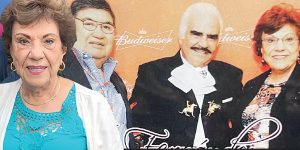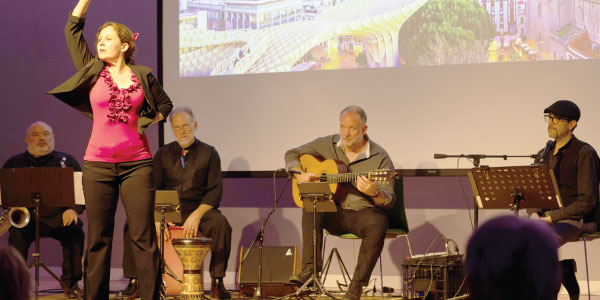El martes, 20 de enero, en Central Exchange en Kansas City, Mo., líderes hispanos fueron convocados para la primera reunión oficial de los organizadores de la conferencia de verano del Consejo Nacional de La Raza (NCLR).
Un programa de oradores elogió la decisión del grupo de derechos civiles de los hispanos de reconsiderar a Kansas City, Mo., a la luz de su sórdida relación con la organización latina. Janet Murguía, una nativa de Kansas City y Presidenta y Ceo del grupo, y la alcaldesa temporal Cindy Circo hizo una mención específica del fallido intento de Kansas City para atraer la cumbre en 2009. La convención de cuatro días —y el estimado de $5.5 millones que la reunión habría generado al comercio local— se fueron a Los Ángeles en su lugar.
En el centro del desacuerdo estuvo Frances Semler, la entonces nombrada para la Junta de Parques por el alcalde Mark Funkhouser y miembro del grupo de vigilancia fronteriza Cuerpo de Defensa Civil Minutemen.
Durante una conversación posterior a su discurso, Murguía reflexionó sobre lo que llamó un “conflicto” con Funkhouser sobre Semler, a quien ella describió como un “miembro muy comprometido y líder” en el grupo de vigilancia fronteriza.
“Ustedes saben, yo intenté traer la convención como la nueva Presidenta y CEO de esta organización a mi ciudad natal, aquí a Kansas City”, informó, pero agregó que ella recibió resistencia tanto de Semler —quien se rehusó a renunciar— como de Funkhouser, quien se movió para proteger a su candidata designada.
NAACP se unió a la denuncia de NCLR de la persona nombrada. La correspondencia interna de la ciudad adquirida por The Lawrence Journal-World indica que Funkhouser no sabía sobre la afiliación de su designada con el grupo de vigilancia fronteriza cuando la nombró.
El grupo de derechos civiles de los hispanos votó el 20 de Oct. de 2007, para sacar la convención, citando específicamente a Semler.
“El liderazgo y nuestros afiliados en la comunidad me pidieron primero traer la conferencia aquí, pero luego, el Alcalde no la removería (a Semler) del grupo; y ellos me animaron a llevarme la convención fuera de Kansas City”, indicó Murguía.
“Fue una decisión difícil, pero creo que fue lo correcto a hacer”, continuó. “Aunque nada me habría gustado más que traer la conferencia a Kansas City, si no tenemos socios que entiendan a nuestra comunidad y que comprendan nuestra misión — y aprecien a nuestra comunidad — entonces no queremos traer contribuciones económicas a esa ciudad”.
Murguía contrastó eso con el actual liderazgo local — en concreto, la sociedad entre el alcalde de Kansas City, Sly James, y el alcalde y CEO del Gobierno Unificado del Condado Wyandotte/Kansas City, Kan., Mark Holland.
“Ahora, por supuesto, tenemos un liderazgo maravilloso en ambos lados del río”, señaló, añadiendo que los Alcaldes han sido inflexibles sobre “mostrar diversidad y demostrar que son ciudades muy acogedoras cuando se trata de comunidades de color”.
“Éste es un cambio real desde los días obscuros del alcalde Funkhouser”, concluyó.
[divider]
NCLR leader declares KC back from “dark days”
By Jesus Lopez-Gomez
On Tuesday (Jan. 20), at Central Exchange in Kansas City, Mo., Hispanic leaders convened for the first official meeting of the National Council of La Raza’s (NCLR’s) summer convention organizers.
A program of speakers lauded the Hispanic civil rights group’s decision to reconsider Kansas City, Mo., in light of its sordid relationship with the Latino organization. Janet Murguia, a Kansas City native and the group’s president and CEO, and Mayor Pro Tem Cindy Circo made specific mention of Kansas City’s failed bid to capture the 2009 summit. The four-day conference — and the estimated $5.5 million the meeting would’ve generated for local commerce — went to Los Angeles instead.
At the center of the disagreement was Frances Semler, then-Mayor Mark Funkhouser’s park board appointee and a member of the border vigilante group the Minutemen Civil Defense Corps.
During a conversation after her address, Murguia reflected on what she called a “conflict” with Funkhouser over Semler, whom Murguia described as a “very committed member and leader” in the border vigilante group.
“You know, I tried to bring the conference as the new president and CEO of this organization to my hometown, here to Kansas City,” she said, but added that she got resistance from both Semler, who refused to resign, and Funkhouser who moved to protect his appointee.
The NAACP joined the NCLR’s denouncement of the appointee. Internal city correspondence acquired by The Lawrence Journal-World indicates Funkhouser didn’t know about his appointee’s affiliation with the border vigilante group when he appointed her.
The Hispanic civil rights group voted on Oct. 20, 2007, to pull the conference, specifically citing Semler.
“The leadership and our affiliates in the community asked me first to bring the conference here, but then, when the mayor would not remove (Semler) from the group, they encouraged me to take the conference away from Kansas City,” Murguia said.
“It was a difficult decision, but I think it was the right thing to do,” she continued. “While nothing would have pleased me more to bring the conference to Kansas City, if we don’t have the partners who understand our community and understand our mission — and appreciate our community — then we don’t want to bring our economic contributions to that city.”
Murguia contrasted that with the current local leadership — specifically, the partnership between Kansas City Mayor Sly James and Unified Government of Wyandotte County/Kansas City, Kan., Mayor/CEO Mark Holland.
“Now, of course, we have wonderful leadership on both sides of the river,” she said, adding that the mayors have been adamant about “showcasing diversity and to showing that they are very welcoming cities when it comes to communities of color.”
“This is a real turnaround from the dark days of Mayor Funkhouser,” Murguia said.










